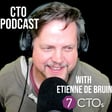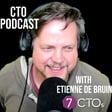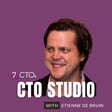
Time Buckets and Stoic Operating Systems: Insights with David Heinemeier Hansson
Join us this week as we have David Heinemeier Hansson on the show to explore various aspects of his experiences and philosophies. The episode covers a wide range of topics, from time management strategies to dealing with criticism and engagement in open-source communities. David shares insights into his daily routine, emphasizing the importance of adapting it based on the nature of the work. The concept of "buckets of time" and using tools like "Reply Later" for efficient email processing are highlighted.
The conversation takes a dive into the significance of embracing boredom for creativity and the value of managing one's time in distinct buckets, whether weekly, monthly, or yearly. David shares with us his approach to handling criticism, with stoicism as his mental operating system, and the evolution of his engagement in the Rails community.
The focus also shifts to the development of Hey.com, the challenges of achieving feature parity, and the importance of building new products with a revolutionary feel rather than replicating existing solutions. The hosts inquire about David's decision-making process, which he describes as primarily intuitive, relying on gut feelings derived from experience, rather than scientific.
We explore the concept of compatibility in business partnerships and offer insights into recognizing and addressing compatibility issues early on. We also discuss Basecamp's exit from the cloud, with David elaborating on the decision-making process and the cost considerations. You won't want to miss this conversation, as it provides a glimpse into David's mindset, experiences, and lessons learned over the years, offering valuable insights for entrepreneurs and enthusiasts alike!
Time Stamps:
[00:33] - We are joined by David Heinemeier Hansson in this episode!
[04:03] - David explains how he manages his time, using what he calls “buckets of time.”
[07:06] - Using a “Reply Later” feature with email helps David manage emails in bulk.
[09:41] - We learn a little bit about David’s daily routine.
[12:40] - According to David, boredom is a powerful conduit for creativity.
[15:40] - David considers Ruby on Rails to be a creative outlet for him.
[17:53] - Dealing with feedback and criticism involves perceiving it through a Stoic mindset, allowing intentional detachment.
[20:39] - David argues that wishing to change the world is futile; Stoicism guides focusing on controllable aspects for productivity.
[24:40] - Etienne shifts the conversation toward panel gaps.
[28:22] - David's decision-making relies almost entirely on intuition, embracing possibilities, avoiding exhaustive analysis, and prioritizing creativity over conventional metrics.
[32:09] - David advises against squandering crucial years and to engage with the world with strength and integrity.
[35:48] - David discusses his business partnership with Jason Fried.
[39:29] - Spending decades with an incompatible partner is challenging; finding compatibility early is crucial for success.
[43:13] - Choosing collaborators involves a simple rule: work with those you vibe with, making collaboration smoother.
[44:43] - David adds that choosing partners, whether in business or romance, involves chemistry; connection matters more than checkboxes.
[46:36] - Reflecting on his growth as a writer, David appreciates past phases.
[50:03] - David explains why Basecamp exited the Cloud.
[53:15] - Migrating from cloud to in-house infrastructure saves costs which is crucial for business sustainability.
[56:10] - The challenges lie in the unpredictability of lucrative credits, sudden soaring costs, and managing profit


